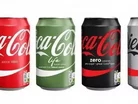Coca-Cola isn't following Pepsi into dropping aspartame, should you?

Last month, PepsiCo announced major changes coming to its Diet Pepsi formula. The global snacks and soft drinks business reported that, starting later on in 2015, Diet Pepsi would be swapping out the aspartame sweetener in Diet Pepsi, Caffeine Free Diet Pepsi, and Wild Cherry Diet Pepsi with a blend of sucralose and acesulfame potassium. (Think: Splenda.) Now Coca-Cola has released a statement of its own—confirming that it will not be changing the classic formula for lead Diet Pepsi rival Diet Coke.
Aspartame in general has been falling out of favor for some time now, with more natural sweeteners like sucralose and stevia gaining popularity in its place. But Coca-Cola’s reasoning for sticking with aspartame is also fairly compelling—why fix what isn’t broken? Essentially as long as consumers are happy with the taste of Diet Coke that they’re used to, Coca-Cola sees no need to mess with a winning formula:
That’s something that any executive in the soft drink industry—or any sector considering making a change in the name of health—needs to think about and weigh carefully. Would a change in formula change the taste of your product? If so, how would that change affect your relationship with consumers? Further down on the Top 10 list of highest selling soft drinks, Diet Pepsi has more to gain by tweaking its formula for higher consumer appeal. But Diet Coke is already almost at the top of the list—in this case, changing its formula could do more harm than good to its sales.
It’s a tough choice, and as sales of traditional soft drinks continue to decline overall, making the right choice can be the difference between sinking and swimming in the industry. What would you choose?



